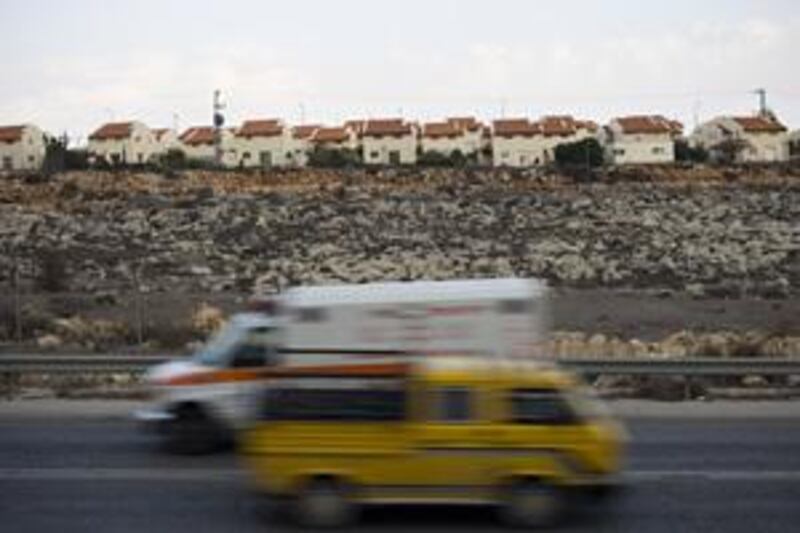RAMALLAH // Israel will not demolish nine houses in a West Bank settlement in spite of a court order to do so, because they were inhabited months ago and are within the confines of the Ofra settlement.
Ehud Barak, the Israeli defence minister, informed the court on Sunday of his decision, a day before an Israeli High Court hearing on the matter. Mr Barak said "no unique position" should be settled with respect to the houses in isolation of the settlement as a whole. The news comes on a day Palestinians in Sheikh Jarrah and Shufat, both in occupied East Jerusalem, fight home evictions, house demolitions and, in the latter case, the expropriation of 30,000 sq m of land on the edge of the Shufat Refugee Camp for the building of a military checkpoint that will sever the camp's 30,000 inhabitants from the rest of Jerusalem.
Yesh Din and B'Tselem, two Israeli human rights groups, had filed a petition last June against the nine houses in Ofra on behalf of residents of the neighbouring village of Ein Yabrud, who claim ownership of the land the houses were built on. Despite the court finding in favour of the petitioners and the admission last year by Haim Ramon, the deputy prime minister, that all 450 homes in Ofra were built on privately owned Palestinian land, the Ofra settlement council proceeded with moving families into the nine houses and connecting them to electricity and water networks.
The Israeli High Court was expected to issue a ruling on the houses yesterday, but without the support of the ministry of defence, that ruling will matter little in the short term. It is the latest in a series of futile attempts by Israeli human rights organisations and Palestinian residents to hold Israel accountable to its international obligations as well as domestic law with regard to its settlement projects in occupied territory.
Under the 2003 US-sponsored road map, Israel committed itself to ending settlement expansion and dismantling settlement outposts in the occupied territory. Israel has interpreted the former condition as not applying to the "natural growth" of settlements and has proceeded unimpeded to issue tenders for new housing in settlements across the West Bank and East Jerusalem, something that played no small part in undermining the Annapolis process with Mahmoud Abbas, the Palestinian president.
Israel has also not made any attempt at removing settlement outposts, even though Ehud Olmert, the outgoing prime minister, made that a campaign promise when he won elections in 2006. Under international law, all settlements in occupied territory are illegal, but Israeli law makes a distinction between established settlements and so-called settlement outposts, which are established without prior government consent and are considered illegal. Nevertheless, most of these outposts receive state support and are connected to electricity and water grids and many eventually become recognised settlements.
In fact, Ofra, north-east of Ramallah and 24km east of the 1967 border, was in 1975 the first settlement to be thus established and win recognition from a Labor government led by Yitzhak Rabin and with Shimon Peres, now Israel's president, as defence minister. Today, Ofra is considered the flagship of the settlement enterprise, having been established in the heart of densely populated Palestinian areas with the express intention of making it impossible to turn over the West Bank to Palestinian control.
The decision by Mr Barak not to demolish nine settler houses while hundreds of Palestinian houses remain under threat of demolition has everything to do with politics and nothing to do with law, according to Jeff Halper of the Israeli Committee Against House Demolitions, ICAHD. "The Israeli government can't go out and say, 'our policy is to demolish Palestinian homes and build Jewish settlements'. [But] all this so-called legal stuff is used as a facade for a country that presents itself as a democratic country."
According to ICAHD figures, in 2009 alone 36 Palestinian houses were demolished, either as a punitive measure or under so-called administrative orders, when houses were built without permission. Should military destruction be included, the war on Gaza resulted in the destruction of 4,247 Palestinian houses and buildings. Since 1967, ICAHD has calculated, 24,130 Palestinian homes in occupied territory have been demolished.
"If someone is trying to read into this real justice or fairness or law, it's not there. The planning and the law are just tools. And if the law works against you, you just violate it because it's just a tool," said Mr Halper. With Mr Barak reportedly trying to convince his Labor party to join in a coalition with Benjamin Netanyahu, Israel right wing prime minister designate and a champion of the settlement project, the timing of the decision may also be intended to curry favour with potential new coalition partners.
"Probably, Barak is positioning himself to getting into government with Netanyahu," said Mr Halper. "Israel can act with impunity. The international community doesn't really care, nor does the Israeli public. So, absent any real pressure, why demolish nine settler houses?" okarmi@thenational.ae





